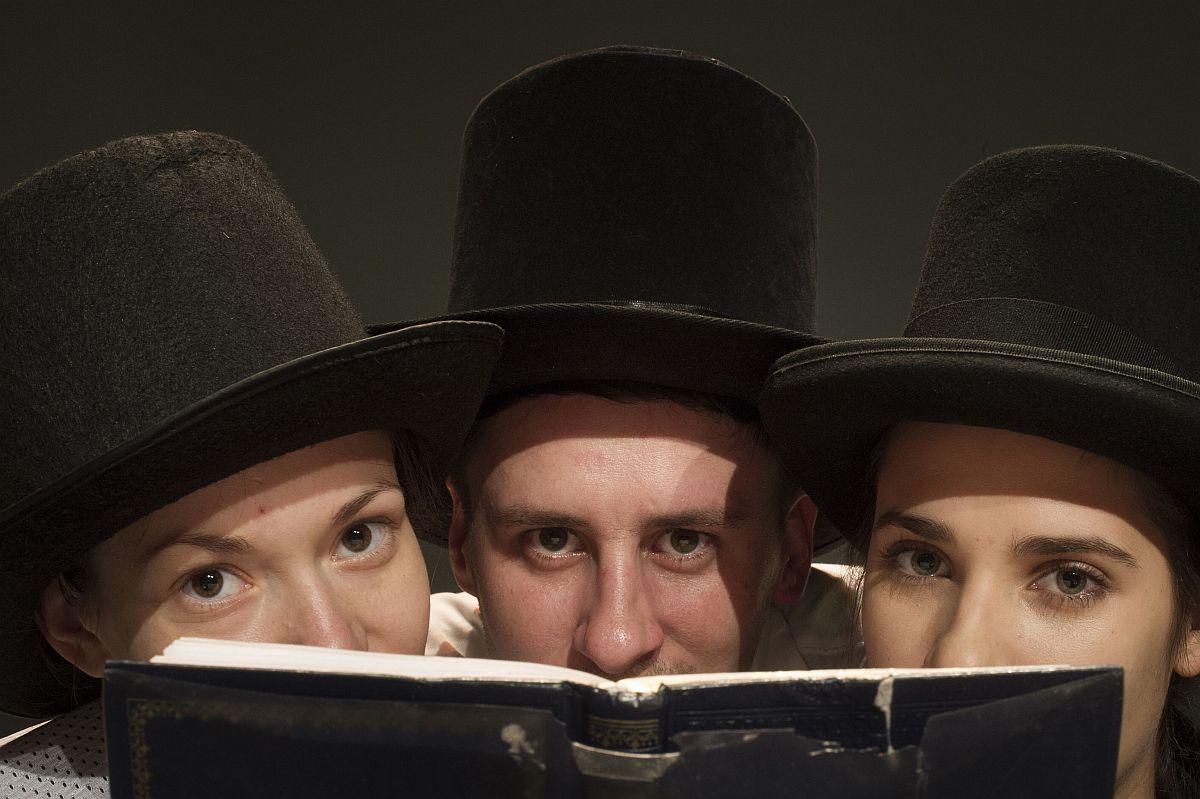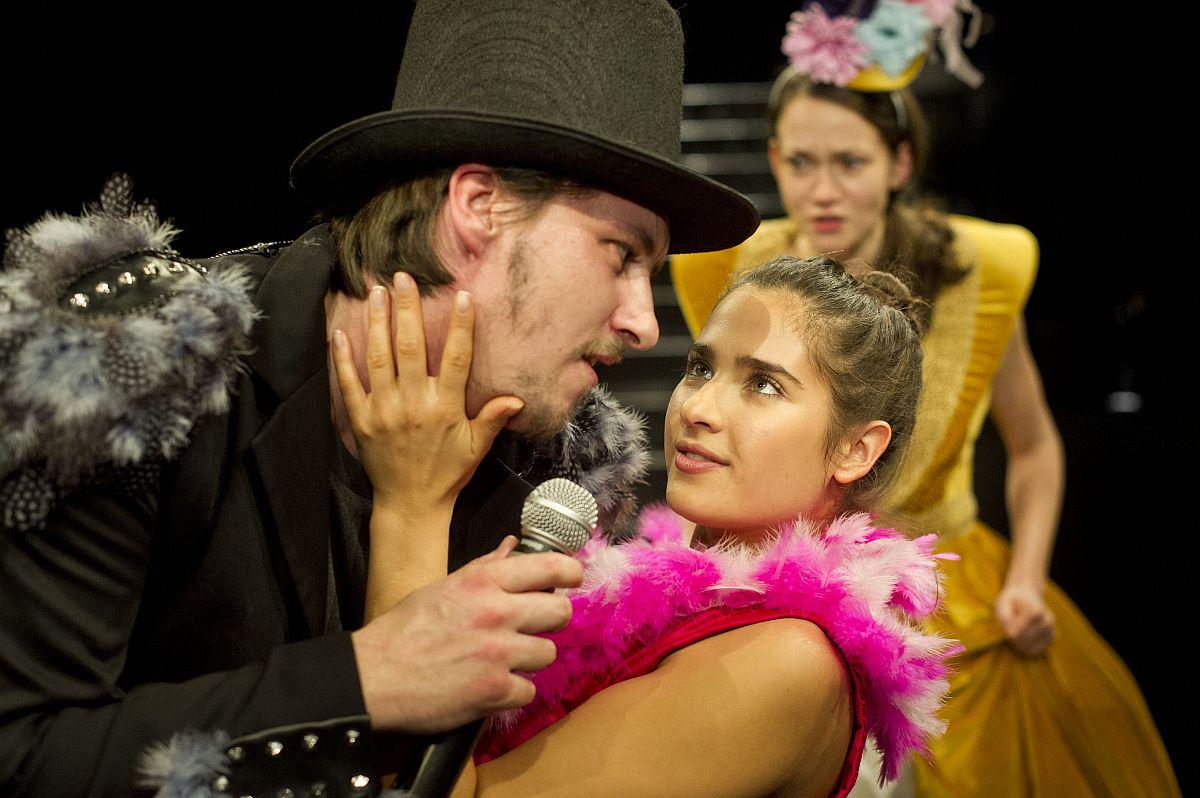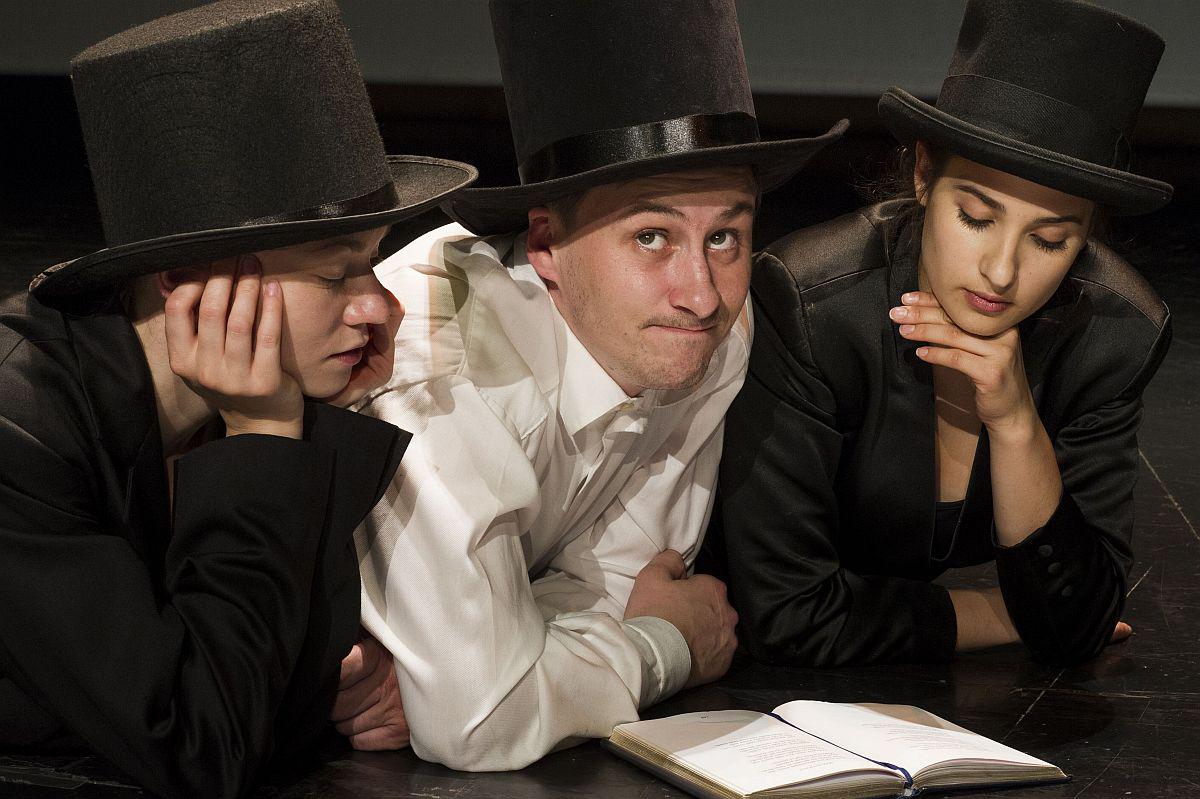




Having adapted Prešeren’s poems for a drama script full of humorous passages and songs, the authors of the concept are breaking down the barrier between the poet and the young.
The purpose of the performance is to show the young, its intended audience, that theatre can be interesting, as well as that poetry has sense and is not merely what is taught at school. Poetry can be understood in every way and can be rewritten, emphasise the authors of the concept Maruša Kink, Simona Hamer and Mija Špiler, as well as the actors Jernej Čampelj, Tina Gunzek and Saša Pavlin Stošić. This was exactly how they approached the performance “Prosto po Prešernu”, which was directed by Maruša Kink, and produced by Margareta Schwarzwald Institute in cooperation with Cankarjev dom.
An elaborated love story of Rosamund of Auersperg and the baron of Schärffenberg
The Prešeren ballad “Turjaška Rozamunda” (Rosamund of Turjak) provides a base for the play, into which excerpts from many other Prešeren’s poems are incorporated, such as “Povodni mož” (The River Man) “Zdravljica” (A Toast), “Pod oknom” (Below the Window), “Pevcu” (To the Poet) and “Zvezdogledi” (Stargazers). The performers portray heroes from Prešeren’s poems and set some of his poems to a completely different context. Moreover, they improvise on the play full of humorous inserts, scenes from everyday life and spontaneous speech.
According to Maruša Kink, who is an actress by profession and has for the first time faced the challenge of direction, the performance is a result of collaborative work. Her input was a poetic script which is an elaboration of the love story between Rosamund of Turjak (or of the Auersperg noble family) and the baron of Svibno (or Schärffenberg, meaning “a sharp hill”; hence Prešeren’s “Ojstrovrhar”), which involves characters and scenes from several Prešeren’s poems. The script, which was built on this story, was at first improvised and later improved with verses that carry particular messages. Ms Kink wanted the poetic output to become “airy, meaty and down to earth”.
Muses and art
The performance also features muses. Although Prešeren does not describe them in his poetry, the dramaturge Simona Hamer thinks that “every artist must have their own muses”. Moreover, she says that Prešeren’s poetry was heavily influenced by his muses.
In the performance, music has also an important role, since it combines diverse scenes to form one story. In addition to this, three poems that were set to music by Boštjan Gombač and are sung by stage performers deserve special attention, namely “Pod oknom”, “Zvezdogledom” and “Pevcu”. The main goal was to create an interesting and comprehensible performance which does not take on too much theatricality but presents Prešeren’s poetry in an attractive and humorous way, with an emphasis on issues which the young can recognise as their own.
Unrequited love and despair
Prešeren was often inspired by unrequited love and despair, which are feelings that also teenagers experience. According to Mija Špiler, France Prešeren, his characters, and teenagers have more in common than it may seem at first. However, it is necessary to overcome resistance to the poet with whom we become familiar at a very early stage of education, when we may not yet understand his works, or may hardly enter into the spirit of the old-fashioned language and lifestyle in his time.
New elements can also be found in Prešeren’s poetry
“Prešeren’s works are complex, and in my opinion, his poetry is not easily comprehensible to primary school children,” said Saša Pavlin Stošić, who admitted that when she was a child, Prešeren was not her favourite poet. For this reason, she will be delighted if the performance succeeds in presenting Prešeren’s poems to the young in a way that they would understand them and make them their own, and at the same time show enthusiasm for poetry. Incidentally, with this performance a childhood wish of Ms Pavlin Stošić came true: as a child, she was so enthusiastic about the gorgeous Urška from Ljubljana (a woman character from the ballad “Povodni mož”) that she was fascinated by her picture in the book; now, besides performing other roles, she also portrays Urška.
On the other hand, Tina Gunzek at first expressed scepticism about Prešeren: “Maruša wanted to introduce Prešeren’s poetry in a new way, which may seem unusual. Nevertheless, we are all familiar with Prešeren’s works, what more could there be? However, during the preparations for the performance we have recognised interesting facts, and each of us has revealed something new in Prešeren’s poetry, that is elements which can form a merry performance [in Slovene, “prešeren” also means “merry” – translator’s remark]."
Not necessarily boring
However, Maruša Kink has long wished to direct a performance about Prešeren. She likes Prešeren’s poetry very much. At the same time, it was quite a challenge for her to give a performance for schoolchildren, who are often a forgotten audience. This is why she has focused on the young: she decided to direct a performance built on Prešeren’s poetry in order to show that what is compulsory is not necessarily boring or unexciting, as may be studying Prešeren’s poetry.

































































